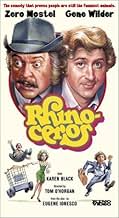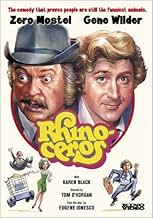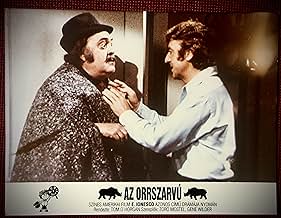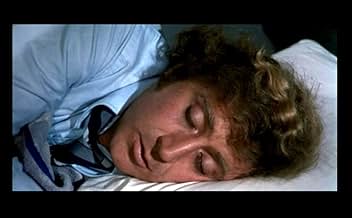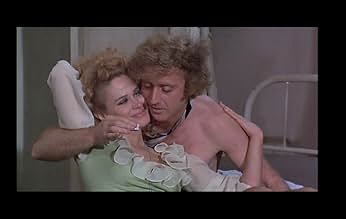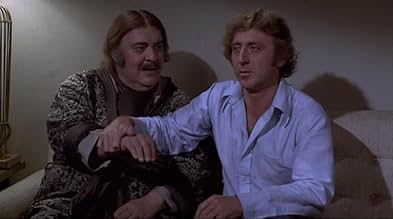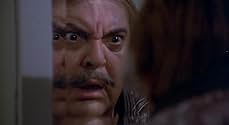Agrega una trama en tu idiomaA boozing young man in love with his co-worker finds that everyone around him, even his pompous and condescending best friend, is changing into a rhinoceros.A boozing young man in love with his co-worker finds that everyone around him, even his pompous and condescending best friend, is changing into a rhinoceros.A boozing young man in love with his co-worker finds that everyone around him, even his pompous and condescending best friend, is changing into a rhinoceros.
- Premios
- 1 nominación en total
- Young Woman
- (as Melody Santangelo)
- Woman in Black with Baby Carriage
- (sin créditos)
- Dirección
- Guionistas
- Todo el elenco y el equipo
- Producción, taquilla y más en IMDbPro
Opiniones destacadas
Admittedly, it's a totally outlandish idea. But, that's a characteristic of the theater of the absurd. We don't actually see any members of the family Rhinocerotidae, we just hear their snorts. Nonetheless, I was laughing almost the whole time. Wilder is particularly funny as the uptight office clerk who falls apart as he watches all his acquaintances change. Zero Mostel's transformation is the best, while Karen Black's character is the most dynamic in the whole movie.
Pretty neat.
Ionesco knew a little something about zoology in that he picked of all the creatures in the animal kingdom, the Rhinoceros is the one he chose. Rhinoceros is an animal with a thick hide, a small brain relative to its body, good hearing, great sense of smell, but absolutely limited vision. Their tempers are quick to arouse when they perceive a threat and once charging they're hard creature to stop. It's a good thing they're herbivores, if they were carnivores, they not the lion would be king of the jungle. And they travel in herds, when not in their usual mud habitat, chewing on their cud.
And Rhinos are what people are gradually turning into in this small town which was set in France, but could easily be any small town in the world. They are a great deal more provincial and the chances of finding folks who are individualistic are slimmer. My guess is that Ionesco lived in small towns in his formative years and hated it.
Rhinoceros ran for 240 performances on Broadway in 1961 and starred Zero Mostel and Eli Wallach in the part that Gene Wilder plays in the film. The casting of Wilder was obviously done to exploit the chemistry Mostel and he demonstrated in Mel Brooks's The Producers.
Mostel like in The Producers by dint of his stronger personality tries to get Gene Wilder to change his ways. Wilder is a mousy little man who has a dead end job in a newspaper, can't get to first base with the object of his affection, Karen Black, and likes to drink a little too much more than is good for him.
But while Zero is giving Gene his spiel about straightening out, the first of many Rhinoceros make their appearance outside the café they are lunching at. Gradually one by one the whole cast turns into these creatures, the whole town does except poor Wilder who is left sheepishly alone.
Mostel won a Tony Award for his role in the original Broadway production, but it really is Wilder's film, he definitely has more screen time. Wilder definitely should have gotten more acclaim for what he did in Rhinoceros.
The theater of the absurd is not to everyone's taste, but for those that do appreciate it, this production of Rhinoceros should fill your bill.
Depressed, bored accountant Stanley (Gene Wilder) spends his week-days crunching numbers and his weekends drinking himself into a haze. His friend John (Zero Mostel) disapproves, but still meets Stanley every Sunday lunchtime to talk to him about the error of his ways. One particular Sunday, their lunch is interrupted when a stampeding rhinoceros charges down the street outside the restaurant. Soon, more and more rhinoceroses are sighted in town and Stanley gradually begins to realise that the entire population is turning into these huge pachyderms. More alarming still is that everyone that Stanley counts on to "remain" human seems to be switching to rhinoceros form too - his work colleagues (Joe Silver, Robert Weil, Percy Rodriguez), his dream girl Daisy (Karen Black), and even his best friend John. Stanley is determined not to conform, but as the human numbers dwindle and the rhinoceros population soars, will he be able to resist?
One of the main problems with this film version of Rhinoceros is that it doesn't use the possibilities of film to "open-up" the constraints of its stage-bound play origins. For instance, during the scene where Mostel's character transforms into a rhinoceros, Wilder keeps commenting on the bump appearing on his forehead and the greyness of his skin, but there's no bump or greyness visible. Here was an opportunity to use the visual advantages that film has over the theatre stage, but it remains an unused opportunity. In fact, at all points the film refuses to become cinematic and constantly has a feel of "filmed theatre" about it. However, in other ways Rhinoceros is quite well done and credit needs to be given where it is due (Maltin rated this film BOMB, which shows how wide of the mark Maltin is prone to be). Wilder and Mostel interact brilliantly, relishing the play's enigmatic and often self-contradictory dialogue. Mostel's transformation sequence - done without make-up or visual effects, as noted earlier - is almost compensated by the sheer outrageous energy that Mostel invests in it. And, by removing the historical and political subtext of the original play, I think they've actually made it more timeless by focusing more on the themes of conformity (after all, don't we all relate to how it feels to spend our lives conforming, losing more and more of the animal-like freedom that was a characteristic of primitive man?) Transforming into a rhinoceros could be viewed as a metaphor for any type of conformity - doing drugs because all your peers do them; being promiscuous because it's the norm; voting for a particular political party because everyone else on your street is in favour of that party; etc.
Not a complete success, then, but definitely a worthwhile and thought-provoking piece of cinema.
"What you are about to see," reads the introductory title card, "could never take place. Several eminent scientists have assured us of this fact, for, as they are quick to point out... the world is flat."
Are they? That dismal attempt at irony is an omen for the rest of the movie. Whatever value Eugène Ionesco's absurdist play may have had on stage, this film adaptation is a leaden allegory, filled with room-wrecking slapstick, that is exhausting, exasperating and tedious. Zero Mostel, who won a Tony for playing the same role on Broadway in 1961, has a transformation scene that is fascinating for its sweaty excess, but his antics can be better appreciated in "The Producers" (1968) in which he and Gene Wilder are actually funny. In this film, the two play off each other just as well, but it doesn't come to much.
No rhinoceroses appear, which might sound like admirable restraint (if not an impoverished budget), but the movie already opened up the play considerably and added a dream sequence and a lot of Keystone Comedy antics. Not showing us rhinoceroses just seems irritatingly coy.
'Rhinoceros' to me is one of the weakest of this inconsistent series of films adapted from plays, one that started off so well but was very mixed from 'A Delicate Balance' onwards. Of the other films in the series, only 'Jacques Brel is Alive and Well and Living in Paris' is worse and the film is a not a patch on the earlier winners 'The Iceman Cometh' and 'The Homecoming'. 'Rhinoceros' definitely has its good things, but it primarily suffers from trying too hard and taking the wrong approach to the source material.
As said, there are things done well. Wilder had always been a very funny and expressive performer and actor, he shows both here beautifully whether verbal or non-verbal. Mostel is larger than life, without dominating too much, and often riotous. His finest being his transformation scene. A very memorable scene, for Mostel's delivery and the very effective use of shadows and POV camera angles. Wilder and Mostel are a dream together, having lost none of what made their chemistry so memorable in 'The Producers'.
Karen Black's honest performance is the standout of the rest of the cast, the overall standard of the rest of the cast being not bad at all. The dialogue is still fun, although there are a number of deviations and changes (most of the adaptations of the American Film Theatre series were actually quite faithful). There is some nice photography, particularly interesting in the transformation.
However, a lot doesn't work. As said, 'Rhinoceros' does try too hard and is very bizarre. Absurdist humour is meant to be strange but usually not this strange, this film goes overboard to beating around the head degrees and like some incredibly weird, increasingly confused and uncomfortable dream that one can't wake up from. Cohesion is lost as a result and the tone felt muddled. Some of the imagery in the more bizarre scenes are pretty cheap and at odds with the dialogue. The pace can be too frantic but it also can be tedious from doing too little with its content. For example what makes the play so relevant and the political references are both too toned down and preachy, as well as now out of date.
It would have been better too if the humour was delivered in a more deadpan way, that way it wouldn't have felt so over the top, strained and vulgar. A consequence of approaching from too farcical an approach and overdoing the farce. The music also dates the film and very of the time. There was a sense to me that 'Rhinoceros' didn't know what it wanted or was trying to be and was instead experimenting the entire time.
Summing up, one-time watchable but the second weakest of this interesting but uneven series of films. 5/10.
¿Sabías que…?
- TriviaDuring the rehearsals of his transformation scene, Zero Mostel refused to break any of the props, wanting to leave the destruction until he was actually shooting the scene.
- Citas
John: So, you finally managed to get here. You're late as usual, of course.
Stanley: No, I...
John: Our appointment was for eleven thirty. It's practically noon now.
Stanley: I'm sorry John. Have I kept you waiting long?
John: No. I just got here myself.
Stanley: Oh, well, then I don't feel so bad.
John: That's beside the point. I don't like to be kept waiting and since you're never on time, I always come late on purpose.
- ConexionesFeatured in No Small Parts: Anne Ramsey (2014)
Selecciones populares
- How long is Rhinoceros?Con tecnología de Alexa
Detalles
- Fecha de lanzamiento
- País de origen
- Idioma
- También se conoce como
- Eugene Ionesco's Rhinoceros
- Locaciones de filmación
- Productoras
- Ver más créditos de la compañía en IMDbPro
- Tiempo de ejecución1 hora 44 minutos
- Relación de aspecto
- 1.85 : 1
Contribuir a esta página



